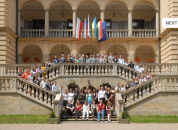
The Visegrad Summer School is a two-week educational programme which provides an interdisciplinary learning space for young Czech, Hungarian, Polish and Slovak students, and for their peers from other Central and Eastern European countries.
The programme consists of lectures, panel debates and seminars on issues and challenges relevant to the Visegrad Group region, the European Union and the CEE countries. The topics cover current social, economic, political and cultural issues, such as global poverty, financial crisis, energy security, social responsibility of the media sector as well as European and regional identity and common cultural heritage. As former editions have shown the Visegrad Summer School is an unique forum to build relations of acceptance, friendship and cooperation between young people, who will form the political, cultural and economic elites of their countries in the near future.
aim
The Visegrad Summer School is an initiative organised by the Villa Decius Association since 2002. Our idea is to create an alternative platform to university for advanced studies on the Visegrad Group as well as other Central and East European countries. The programme is an opportunity for the participants to get acquainted with and discuss current social, security, economic, political and cultural issues. It is also an opportunity to learn about each other and start an international cooperation between the people and the countries.
programme
The programme of the eighth edition of the Visegrad Summer School includes debates on current political, cultural and social challenges in the global and European perspective, e.g. global poverty, refugee problems, financial crisis and its consequences, euro-zone enlargement, European identity crisis and state of civil societies in V4, gender equality, social responsibility of the media sector. Energy security issues, regional cooperation and the Corporate Social Responsibility will also be discussed. Students apply the theoretical knowledge in practical activities. During workshops they develop political and social projects that aim at establishing collaboration between them and their countries. Students can also take part in art projects – film or photo workshops. An important part of the cultural section are lectures on the culture-forming role of cities and a presentation of the cities competing for the title of the European Capital of Culture. On the weekend participants will take part in study visits to Auschwitz-Birkenau and Kazimierz, the former Jewish district in Krakow. They will also attend artistic events to learn about the culture of Cracow and visit the ethnographical museum of the Małopolska region.
target group
Students, graduates, PhD researchers, young professionals from the Czech Republic, Hungary, Poland, Slovakia, Ukraine and other CEE countries. We are looking for active, open-minded and creative people. The working language of the School is English, so good communication skills in English are essential.
participants
- Anderson Nina
- Baranyai Nóra
- Barna Andrea
- Braunova Martina
- Búry Tomáš
- Chicioroaga Oana
- Ciszewska Ewa
- Demko Iryna
- Drliková Jana
- Drozd Piotr
- Ebralidze Sophio
- Fejza Memli
- Grzymała Katarzyna
- Guziak Katarzyna
- Horánska Martina
- Kovács Gábor
- Krchňák Pavel
- Kretkowska Aleksandra
- Latináková Marta
- Mackova Emanuela
- Maksymovych Serhiy
- Melenciuc Ioana-Roxana
- Mikušová Jarmila
- Mombekova Nadirabegim
- Motiyets Yulia
- Mrkva Ondřej
- Némedi Márk
- Nemethová Zuzana
- Nováková Zuzana
- Olti Máté ÁdámPerecsényi Melinda
- Prisikin Boglarka
- Puchejda Adam
- Raciborski Eszter
- Rohava Maryia
- Rosenzweig Libor
- Schütz Ondrej
- Skoupý Jiří
- Skvortsova Nadezhda
- Slováková Viera
- Soltész Béla
- Strapatá Barbora
- Tagiyeva Tahira
- Tomala-Wawrowska Justyna
- Tyshkevych Dmytro
- Zamejc Anna
- Auditor:Czepita Anna



